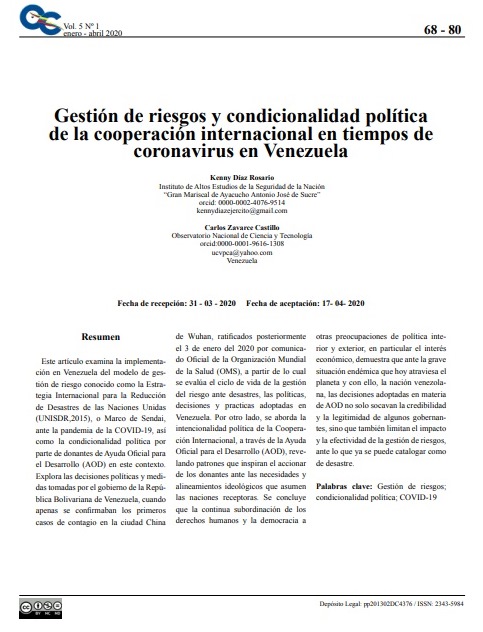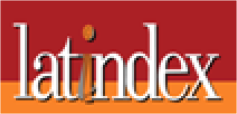Risk management and political conditionality of international cooperation in Venezuela during COVID-19
Keywords:
Risk management; political conditionality; COVID-19Abstract
This This article examines the implementation in Venezuelaof the risk managemen model known as the United Nations International Strategy for Disaster Reduction (UNISDR, 2015), or Sendai Framework to the COVID-19 pandemic, as well as political conditionality by Official Development Aid (OAD) donors in this context. It explores the political decisions and measures taken by the government of the Bolivarian Republic of Venezuela, when the first cases of contagion were barely confirmed in the Chinese city of Wuhan, subsequently ratified on January 3rd, 2020, by Official Communiqué of the World Health Organization (WHO), from which life cycle of disaster risk management, policies, decisions and practices adopted in Venezuela, are assessed. On the other hand, the political intentionality of International Cooperation is addressed through the Official Development Aid (OAD), revealing patterns that inspire donor action in the face of the ideological needs and alignments that recipient nations assume. It is concluded that the continued subordination of human rights and democracy to other domestic and foreign policy concerns, in particular economic interest, make it clear that in the face of the serious endemic situation that is currently going through the planet as well as in the Venezuelan nation, decisions taken on OAD not only undermine the credibility and legitimacy of some leaders, but also limit the impact and effectiveness of risk management, in the face of what can already be classified as a disaster.
Downloads
References
Bello, B. (2004. Medicina de Desastres. Cuba: Editorial Ciencias Médicas.
Constitución de la República Bolivariana de Venezuela. (2009). Gaceta Oficial Oficial Extraordinaria N° 36.860 de fecha 30 de diciembre de 1.999
Chauvet, L. and Guillaumont, P. (2019). ‘Aid and Growth Revisited: Policy, Economic Vulnerability and Political Instability’. Washington DC: World Bank.
Chhotray, V. and Hulme, D. (2019). Contrasting Visions for Aid and Governance in the 21st Century: The White House Millennium Challenge Account and DFID’s
Drivers of Change. World Development. Kosack, S.(2003).‘Effective Aid: How Democracy Allows Development Aid to Improve the Quality of Life’, World Development.
Ley Orgánica de los Estados de Excepción. Gaceta Oficial N° 37.261 de fecha 15 agosto de 2001.
Molenaers N. and Nijs L.(2009). ‘Political conditionality and foreign., Development policy review.
Mosley P., Hudson J. & Verschoor A. (2019). ‘Aid, Poverty Reduction and the ‘New Conditionality’’. In: The Economic Journal, (June).
Observatorio Nacional de Ciencia, Tecnología e Innovación (2010). Informe COVIT-19. En Red. Disponible en: http://www.oncti.gob.ve/covid.html .
Oficina de las Naciones Unidas para la Reducción del Riesgo de Desastres (UNISDR) (2015). La Estrategia Internacional para la Reducción de Desastres de las Naciones Unidas. En Red. Disponible en: www.eird.org.
Organización de las Naciones Unidas (2020). Resolución A/74/L.56 & Add.1 “Cooperación internacional para garantizar el acceso mundial a los medicamentos, vacunas y equipo médico para hacer frente a la COVID- 19”. New York.

Downloads
Published
How to Cite
Issue
Section
License

This work is licensed under a Creative Commons Attribution-NoDerivatives 4.0 International License.







